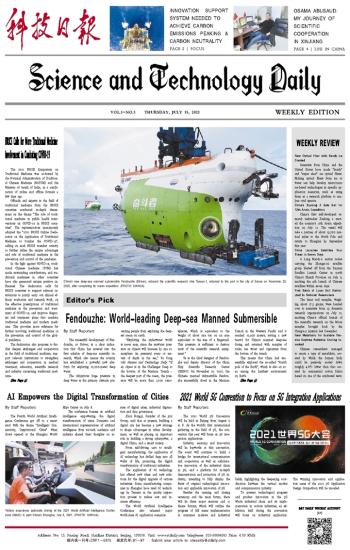
 Innovation Support System Needed to Achieve Carbon Emissions Peaking and Carbon Neutrality
Innovation Support System Needed to Achieve Carbon Emissions Peaking and Carbon Neutrality My Journey of Scientific Cooperation in Xinjiang
My Journey of Scientific Cooperation in Xinjiang BRICS Calls for More Traditional Medicine Involvement in Combating COVID-19
BRICS Calls for More Traditional Medicine Involvement in Combating COVID-19 Fendouzhe: World-leading Deep-sea Manned Submersible
Fendouzhe: World-leading Deep-sea Manned Submersible WEEKLY REVIEW
WEEKLY REVIEW AI Empowers the Digital Transformation of Cities
AI Empowers the Digital Transformation of Cities 2021 World 5G Convention to Focus on 5G Integration Applications
2021 World 5G Convention to Focus on 5G Integration Applications S&T DAILY WECHAT ACCOUNT (EN)
S&T DAILY WECHAT ACCOUNT (EN)
 |
Achieving carbon peaking and carbon neutrality is an inevitable requirement for building China's ecological civilization and high-quality development, according to Wang Zhigang, the Minister of Science and Technology. Speaking at a recent conference under the theme of "Key Technical Issues and Engineering Paths to Carbon Peaking and Carbon Neutrality," Wang added that focusing on the carbon issue demonstrates the responsibility China has undertaken to build a community with a shared future for humankind. "It is therefore crucial to establish a support system for scientific and technological innovation in an effort to peak carbon emissions and achieve carbon neutrality." said Wang.
According to Wang, carbon peaking and carbon neutrality will bring a sci-tech revolution, significantly changing the economy, society and environment, the significance of which is no less than that of the Third Industrial Revolution.
It will also have a bearing on the future development advantages, sustainable security and reshaping of the geopolitical and economic landscape.
"The economic development and carbon emissions in China have a strong coupling relationship. To accommodate the sustainable economic and social development and the realization of carbon neutrality, we must rely on scientific and technological innovation." said Wang, adding that building a support system for sci-tech innovation needs to be accelerated, along with realizing the revolutionized reconstruction for a recycling zero carbon society driven by non-fossil energy or renewable resources through the integration and coupling of technology systems and the synergy and optimization of industries and regions.
Li Xiaohong, the President of the Chinese Academy of Engineering, believes that carbon peaking and carbon neutrality is a race about new technologies and new markets.
China needs to speed up the research on advanced low-carbon technologies, accelerate the promotion and application of pollution reduction and carbon reduction technologies, and enhance its technological advantages and reserves in low-carbon and environmental protection sectors. In Li's opinion, carbon peaking and carbon neutrality is a complex systemic project, which requires a comprehensive use of policy, law, economy, administration and promotion to create a good internal and external environment for this goal.
Qiu Yong, the President of Tsinghua University, said that focusing on the goals of peaking carbon emissions and achieving carbon neutrality requires taking full advantage of the wisdom of engineering and technical personnel, and promoting the innovation and development of green and low-carbon technologies through the power of engineering and technology, making contributions to the major strategic deployment and scientific innovation in China.
"The 'carbon peaking and carbon neutrality' goals are two milestones in the energy revolution, which will greatly promote energy conservation and improve energy efficiency, as well as boosting the development of non-fossil energy, steadily reducing the use of fossil energy, and building a new power system with non-fossil energy as the core." said Du Xiangwan, the Academician of the Chinese Academy of Engineering and Honorary Director of China's National Expert Committee on Climate Change.
Du believes that, to realize the the two goals, it is urgent to renew the understanding of China's energy and resource endowment. "The developed renewable energy resources in China are less than one-tenth of the technologically recoverable resources, which shows China has abundant resources for transition to a low-carbon energy system."
"During the process of carbon peaking, we should make top-level designs and draw a roadmap to achieve carbon neutrality." said Du. " To achieve the 'carbon peaking and carbon neutrality' goals is both a complex systematic project and a scientific transformation process, which is highly policy-oriented."
"We need to set the pace and act in a proactive and prudent manner. We should not only avoid the one-size-fits-all approach, but also prevent backward and ineffective investment due to ineffective transition." He added.
Studies have shown that the industry, electricity, transportation and construction sectors in China will be expected to reach carbon peaking by 2030, with total carbon dioxide emissions from energy activities to peak around 2027, which is an increase of about 500-700 million tons compared with that of 2020.
Focusing on the "carbon peaking and carbon neutrality" goals, Mr. Wang Zhigang proposed three suggestions for scientific researchers.
First, carry out more in-depth strategic research to provide stronger support for scientific decision-making.
Second, actively promote scientific and technological innovation and engineering construction related to the goals, and strive to overcome difficulties in key, core and major technological development directions.
Third, build a talent pool and actively conduct international cooperation.

 Next
Next



